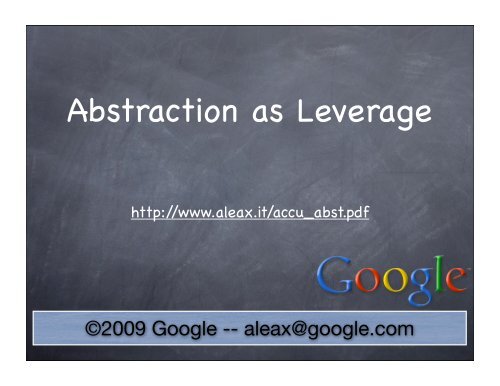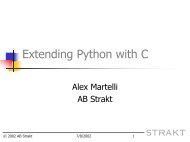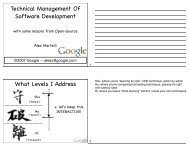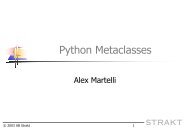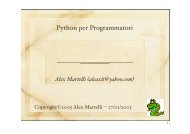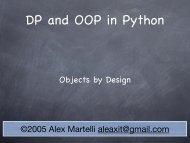Abstraction as Leverage
Abstraction as Leverage
Abstraction as Leverage
You also want an ePaper? Increase the reach of your titles
YUMPU automatically turns print PDFs into web optimized ePapers that Google loves.
<strong>Abstraction</strong> <strong>as</strong> <strong>Leverage</strong><br />
http://www.aleax.it/accu_abst.pdf<br />
©2009 Google -- aleax@google.com
Audience levels for this talk<br />
Shu<br />
("Retain")<br />
Ha<br />
("Detach")<br />
+: let's keep this<br />
interactive !!!<br />
Ri<br />
("Transcend")<br />
2
A Tower of <strong>Abstraction</strong><br />
3
<strong>Leverage</strong>...<br />
...lets you do<br />
much more with<br />
so little...<br />
...but can crush<br />
you if things go<br />
wrong!<br />
4
Can’t live without it...<br />
programming (& most other “knowledge work”)<br />
always USES layers of abstraction,<br />
often PRODUCES new layers on top<br />
5
...can’t live with it???<br />
all abstractions “LEAK” (Spolsky’s Law)<br />
bugs, overloads, security attacks, ...<br />
... so you MUST “get” some levels below!<br />
plus, abstraction SHOULD (s.t.;-) “leak”<br />
in a designed, architected f<strong>as</strong>hion<br />
and: abstraction *can slow you down*!<br />
6
Abstract -> Procr<strong>as</strong>tinate!<br />
McCrea, S. M., Liberman, N., Trope, Y., & Sherman,<br />
S. J. -- Construal level and procr<strong>as</strong>tination.<br />
Psychological Science, Volume 19, Number 12,<br />
December 2008, pp. 1308-1314(7)<br />
events remote in time are represented more<br />
abstractly than ones that are close in time<br />
McCrea et al. empirically prove the reverse<br />
also holds: more-abstract construal levels<br />
lead to higher likelihood of procr<strong>as</strong>tination<br />
(at le<strong>as</strong>t for psych students - the only<br />
experimental subjects in ALL literature;-)<br />
7
To achieve, think CONCRETE<br />
Allen’s “Getting Things Done”:<br />
what’s my SINGLE NEXT ACTION?<br />
*Person<strong>as</strong>* in interaction design (and usercentered<br />
design):<br />
NOT “the user”, BUT “Joe Blow, an<br />
inexperienced trader with lots of<br />
videogame experience, ...” or “Marc Smith,<br />
a se<strong>as</strong>oned trader who started back in<br />
the time of Hammurabi and is STILL most<br />
comfortable with cuneiform, ...”<br />
“prefer action over abstr-action” (J. Fried,<br />
“37 signals” founder)<br />
8
All <strong>Abstraction</strong>s Leak<br />
all abstractions leak, because...:<br />
...*all abstractions LIE*!<br />
the map is not the territory<br />
before you can abstract,<br />
you must see the details<br />
i.e.: before you can withdraw,<br />
you must stand close<br />
abstract only once you know all the details<br />
or else, be humble & flexible about it!<br />
9
A great example: TCP/IP<br />
10
One leak: DNS Poisoning<br />
Maybe even better example:<br />
ARP cache poisoning<br />
11
&, some SHOULD leak!<br />
example: remote/distributed file systems<br />
typically try to mimic “local” ones<br />
the less local, the costlier the mimicry<br />
local FS semantics, locking, reliability, ...<br />
“filesystem” may be a superb abstraction<br />
but “LOCAL filesystem” is definitely NOT!<br />
(“never subcl<strong>as</strong>s concrete cl<strong>as</strong>ses”...)<br />
doesn’t mean the abstraction’s BAD to have<br />
but you can’t have ONLY the abstraction!<br />
need systematic ways to get “below” it<br />
12
Good <strong>Abstraction</strong> Use<br />
you MUST be fully aware of at le<strong>as</strong>t a<br />
couple of layers “below”<br />
and to DESIGN an excellent abstraction:<br />
be VERY familiar with SEVERAL expected<br />
implementations (“layers below”)<br />
be VERY familiar with SEVERAL expected<br />
uses (“layers above”)<br />
i.e.: no blinders, no shortcuts!<br />
YOU may be the next implementer OR user!<br />
the Golden Rule makes EXTRA sense;-)<br />
http://c2.com/cgi/wiki?TooMuch<strong>Abstraction</strong><br />
13
A J<strong>as</strong>on Fried quote<br />
“Here’s the problem with copying:<br />
Copying skips understanding.<br />
Understanding is how you grow.<br />
You have to understand why something<br />
works or why something is how it is.<br />
When you copy it, you miss that.<br />
You just repurpose the l<strong>as</strong>t layer instead<br />
of understanding the layers underneath.”<br />
Just ‘%s/copy/use existing high-level<br />
abstractions blindly/g’ ...;-)<br />
14
A Jeff Atwood quote<br />
“don’t reinvent the wheel,<br />
unless you plan on learning more about<br />
wheels!”<br />
15
App Engine “hacks”<br />
RPC<br />
16
The monkeypatching way<br />
all operations go through an RPC layer, via<br />
apiproxy_stub_map.MakeSyncCall<br />
the wrong answer: *monkey-patch* it...:<br />
from google.appengine.api import \<br />
apiproxy_stub_map<br />
_org = apiproxy_stub_map.MakeSyncCall<br />
def fake(svc, cal, req, rsp):<br />
...<br />
x = _org(svc, cal, req, rsp)<br />
...<br />
apiproxy_stub_map.MakeSyncCall = fake<br />
17
Better answer: HOOKS<br />
see: http://blog.appenginefan.com/2009/01/<br />
hacking-google-app-engine-part-1.html<br />
from google.appengine.api import apiproxy_stub_map<br />
def prehook(svc, cal, req, rsp):<br />
...<br />
apiproxy_stub_map.apiproxy.GetPreCallHooks(<br />
).Append(‘unique_name’, prehook, ‘opt_api_id’)<br />
18
Q & A<br />
http://www.aleax.it/accu_abst.pdf<br />
? !<br />
19


